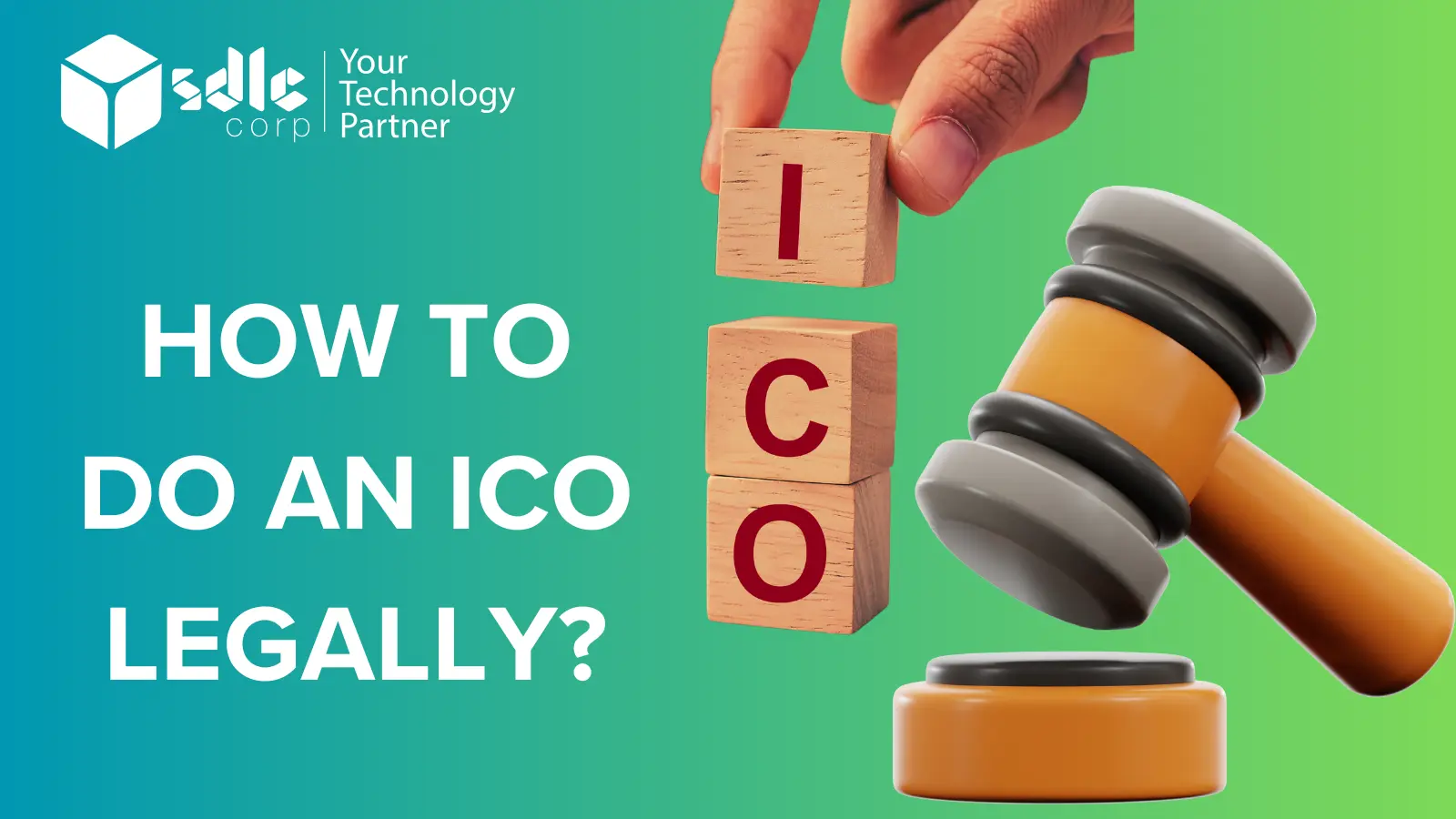How to do an ICO legally?
Introduction
The emergence of Initial Coin Offerings (ICOs) has revolutionized fundraising in the blockchain industry, offering projects a decentralized and innovative way to secure capital for their ventures. However, alongside this opportunity comes a myriad of legal considerations and regulatory complexities that must be navigated to ensure compliance and mitigate legal risks. In this guide, we will delve into the essential aspects of conducting an ICO legally. From understanding regulatory frameworks to drafting compliant documentation and adhering to Know Your Customer (KYC) and Anti-Money Laundering (AML) requirements, we will explore the necessary steps to safeguard your ICO from legal challenges. By adhering to legal guidelines and best practices, ICO projects can not only protect themselves from regulatory scrutiny but also foster trust and confidence among investors, laying a solid foundation for long-term success. Join us as we embark on this journey to uncover the key principles and strategies for conducting an ICO legally in today’s evolving regulatory landscape.

How to invest in ICO? : Investing in Initial Coin Offerings (ICOs) involves purchasing newly issued digital tokens or coins from blockchain projects. To participate, individuals typically need to register with the ICO platform, verify their identity, and then purchase tokens using accepted cryptocurrencies like Bitcoin or Ethereum. Investors should conduct thorough research on the project, its team, whitepaper, and roadmap before investing to mitigate risks associated with ICOs, such as regulatory uncertainties and project viability. Additionally, it’s essential to consider factors like the project’s technology, market potential, and tokenomics before making investment decisions.
What comprises an understanding of ICO regulation?
Global Regulatory Landscape:
- Diverse Approaches: Different countries have adopted varied approaches to regulating ICOs, ranging from embracing innovation to imposing strict restrictions.
- Regulatory Clarity: Some jurisdictions, such as Switzerland and Malta, have provided clear guidelines and frameworks for ICOs, fostering a conducive environment for blockchain projects.
- Regulatory Uncertainty: In many jurisdictions, regulatory uncertainty persists, with authorities grappling with how to classify and regulate tokens and ICOs.
Securities Regulation:
- Howey Test: In the United States, the Securities and Exchange Commission (SEC) applies the Howey Test to determine whether a token qualifies as a security. Tokens deemed securities are subject to registration or exemption requirements under securities laws.
- Token Characteristics: Regulators assess the characteristics of tokens, including investment intent, expectation of profits, and reliance on the efforts of others, to determine their status as securities.
Consumer Protection:
- Investor Risks: Regulators are concerned about the risks posed to investors participating in ICOs, including fraud, scams, and the loss of funds due to market volatility.
- Disclosure Requirements: Some jurisdictions require ICO issuers to provide comprehensive disclosures to investors, including information about the project, tokenomics, risks, and use of proceeds.
AML/KYC Compliance:
- Anti-Money Laundering (AML): Regulators impose AML requirements on ICOs to prevent money laundering and terrorist financing. ICO issuers must implement robust AML procedures and conduct due diligence on contributors.
- Know Your Customer (KYC): KYC procedures are essential for verifying the identity of contributors and ensuring compliance with AML regulations. ICO issuers collect identifying information from investors to mitigate the risk of illicit activities.
Taxation:
- Tax Treatment: ICO proceeds and token transactions may have tax implications for both issuers and investors. Regulators provide guidance on the taxation of ICOs, including income tax, capital gains tax, and value-added tax (VAT).
Ensure your ICO's legality - let's navigate the process!

Where to buy ICO? : Interested in investing in Initial Coin Offerings (ICOs) but unsure where to start? This guide provides insight into the best platforms and exchanges for purchasing ICO tokens, ensuring you make informed investment decisions in the ever-evolving world of cryptocurrency.
What legal considerations should be taken into account before launching an ICO?

Establishing a Legal Framework:
- Legal Entity: Determine the appropriate legal entity for your project, considering factors such as liability protection, tax implications, and regulatory requirements. Options may include corporations, limited liability companies (LLCs), or foundations.
- Jurisdiction Selection: Choose the jurisdiction in which your project will be incorporated and operate. Consider factors such as regulatory clarity, tax treatment, investor protection laws, and political stability. Seek legal advice to assess the advantages and drawbacks of different jurisdictions.
Compliance with Securities Laws:
- Securities Classification: Determine whether the tokens offered in the ICO qualify as securities under relevant securities laws. Consider the Howey Test in the United States and similar tests in other jurisdictions to assess whether the tokens meet the criteria of an investment contract.
- Regulatory Analysis: Conduct a thorough analysis of securities regulations in the jurisdictions where you intend to offer tokens. Understand the registration requirements, exemptions, and compliance obligations applicable to securities offerings to ensure legal compliance.
Intellectual Property Protection:
- IP Ownership: Clarify ownership of intellectual property (IP) rights related to the project, including technology, trademarks, and branding. Ensure that appropriate agreements are in place to protect IP assets and prevent disputes over ownership or infringement.
Data Privacy and Protection:
- GDPR Compliance: If your project collects and processes personal data of individuals in the European Union, ensure compliance with the General Data Protection Regulation (GDPR). Implement privacy policies, data protection measures, and mechanisms for obtaining consent from data subjects.
Anti-Money Laundering (AML) and Know Your Customer (KYC) Compliance:
- AML/KYC Procedures: Implement robust AML and KYC procedures to verify the identity of contributors and mitigate the risk of money laundering and terrorist financing. Conduct due diligence on investors and establish procedures for reporting suspicious activities to regulatory authorities.
Is the localcoinswap ico a good investment? : LocalCoinSwap’s ICO offers investment opportunities in a decentralized cryptocurrency exchange facilitating peer-to-peer trading. Before considering investment, research the project’s viability, market potential, and regulatory compliance, while also assessing associated risks and token utility within its ecosystem.
What are the benefits?

Regulatory Compliance:
Ensuring legal compliance mitigates the risk of regulatory scrutiny, penalties, or enforcement actions, which could disrupt or halt the project’s operations.
Compliance with securities laws and regulations enhances investor protection and fosters trust and confidence in the project.
Investor Confidence:
Conducting an ICO legally signals to investors that the project is transparent, trustworthy, and committed to regulatory compliance.
Compliance with legal requirements reduces investor uncertainty and enhances investor confidence, leading to increased participation in the token sale.
Risk Mitigation:
Addressing legal considerations before launching an ICO helps identify and mitigate potential legal risks and liabilities associated with securities laws, intellectual property rights, data privacy, and anti-money laundering regulations.
Legal compliance reduces the likelihood of legal disputes, lawsuits, or regulatory investigations that could harm the project’s reputation and credibility.
Long-Term Sustainability:
Establishing a legal framework and adhering to regulatory requirements from the outset sets a solid foundation for the project’s long-term sustainability and growth.
Compliance with legal and regulatory standards enhances the project’s reputation, attracts strategic partnerships, and facilitates access to traditional financial institutions and markets.
Market Access:
Conducting an ICO legally opens doors to a broader investor base, including institutional investors, accredited investors, and retail investors who prioritize compliance and regulatory oversight.
Legal compliance enables the project to access global markets and comply with jurisdiction-specific regulatory requirements, expanding its reach and potential for adoption.
Ready to legally launch your ICO? Let's start the journey!

What is the significance of legal documentation and contracts?
Creating Legal Documents:
- Terms of Service: Draft terms of service outlining the rules, rights, and responsibilities governing the use of the project’s website, platform, or services by users.
- Privacy Policies: Prepare privacy policies detailing how user data will be collected, stored, and used, and outlining users’ privacy rights.
- Token Purchase Agreements: Draft token purchase agreements specifying the terms and conditions of the token sale, including disclaimers, warranties, and jurisdiction clauses.
Smart Contract Auditing:
- Security Audit: Conduct a comprehensive security audit of the smart contracts used in the ICO to identify and address vulnerabilities, bugs, or potential exploits.
- Legal Review: Ensure that smart contracts are legally compliant and enforceable and that they accurately reflect the terms outlined in the token sale documentation.
What is the importance of engaging legal counsel?
1. Importance of Legal Counsel:
- Expertise in Blockchain and ICOs: Experienced blockchain lawyers or legal firms possess specialized knowledge and expertise in the unique legal and regulatory challenges faced by ICO projects.
- Navigating Regulatory Requirements: Legal counsel can help ICO projects understand and navigate the regulatory requirements specific to their jurisdiction, industry, and token structure.
- Risk Mitigation: Legal experts identify potential legal risks and liabilities associated with securities laws, intellectual property rights, data privacy, anti-money laundering regulations, and other legal considerations.
- Ensuring Compliance: Legal counsel ensures that ICO projects comply with relevant laws, regulations, and industry best practices, minimizing the risk of regulatory scrutiny, penalties, or enforcement actions.
- Protecting Investor Interests: Legal professionals prioritize investor protection by advising ICO projects on transparent disclosure, fair token distribution, and compliance with securities regulations.
2. Collaborating with Legal Experts:
- Strategic Guidance: Legal experts provide strategic guidance and advice throughout the ICO process, from structuring the token sale to drafting legal documentation and contracts.
- Regulatory Analysis: Legal counsel conducts regulatory analysis to assess the legal implications of the project’s tokenomics, technology, and fundraising model, helping ICO projects make informed decisions.
- Drafting Legal Documentation: Legal professionals draft and review legal documents, including whitepapers, terms of service, privacy policies, token purchase agreements, and smart contracts, to ensure compliance and enforceability.
- Compliance Support: Legal experts assist ICO projects in implementing KYC/AML procedures, data privacy measures, and other compliance measures to meet regulatory requirements and mitigate legal risks.
Conclusion
In conclusion, conducting an ICO legally ensures compliance with regulatory requirements, mitigating legal risks, and building trust and confidence among investors and stakeholders. By prioritizing legal compliance and engaging experienced legal counsel, ICO projects can navigate regulatory complexities, protect investor interests, and lay a solid foundation for long-term success.
Throughout this guide, we have explored the essential aspects of conducting an ICO legally, including understanding ICO regulation, structuring the token sale, drafting legal documentation, and engaging legal counsel. Compliance with securities laws, anti-money laundering regulations, data privacy laws, and other legal requirements is critical for safeguarding the project’s reputation and credibility in the blockchain industry.
"Maximize fundraising opportunities for your project with SDLC Corp’s ICO development company"

FAQs
1: Why is it important to conduct an ICO legally?
A: Conducting an ICO legally ensures compliance with regulatory requirements, mitigates legal risks, and builds trust and confidence among investors and stakeholders. It also helps protect the project’s reputation and credibility in the blockchain industry.
2: What are the key legal considerations before launching an ICO?
A: Key legal considerations include securities regulation, anti-money laundering (AML) and know-your-customer (KYC) compliance, intellectual property protection, data privacy laws, and taxation.
3:What legal documentation is required for an ICO?
A: Legal documentation typically includes a whitepaper, terms of service, privacy policy, token purchase agreement, and smart contracts. These documents outline the project’s vision, tokenomics, terms of sale, and legal disclaimers.
4: How can I ensure compliance with securities laws during an ICO?
A: Compliance with securities laws involves determining whether your tokens qualify as securities, adhering to registration or exemption requirements, and providing accurate and transparent disclosures to investors.
5: What role does legal counsel play in conducting an ICO?
A: Legal counsel provides guidance on regulatory compliance, drafts legal documentation, conducts regulatory analysis, implements compliance measures, and represents the project in legal matters.
Contact Us
Let's Talk About Your Project
- Free Consultation
- 24/7 Experts Support
- On-Time Delivery
- sales@sdlccorp.com
- +1(510-630-6507)















